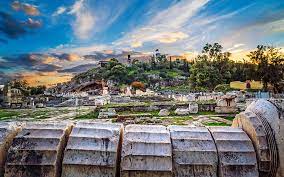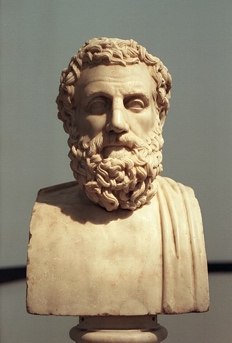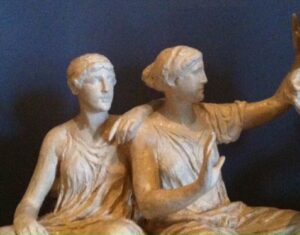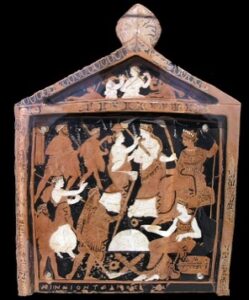
Elefsina or Eleusis (Greek: Ελευσίνα), a small, seaside township, only 21 kilometers from Athens in the Thriasio Plain, is rich in history and mythology. It is the birthplace of the ancient Greek playwright Aeschylus as well as the Eleusinian Mysteries, which are connected to the goddess Demeter (Greek: Δήμητρα) and her daughter Persophone (Greek: Περσεφόνη).
 Aeschylus (Greek: Αισχύλος, born c. 525BC) was an ancient Greek tragedian, and is regarded as the father of tragedy. Only seven of over seventy plays have survived. Besides “Prometheus Bound”, there is also the trilogy of “Oresteia” made up of “Agamemnon”, “The Libation Bearers” and “The Eumenides”, as well as “The Persians”, “The Suppliants”, and “Seven Against Thebes”. He won many first prizes in the Dionysia literature competitions held in Athens in honour of the god Dionysus of wine, merry-making and the theatre. He was also initiated into the Eleusinian Mysteries, and it is said that an attempt was made on his life because he revealed a secret of the Eleusinian Mysteries.
Aeschylus (Greek: Αισχύλος, born c. 525BC) was an ancient Greek tragedian, and is regarded as the father of tragedy. Only seven of over seventy plays have survived. Besides “Prometheus Bound”, there is also the trilogy of “Oresteia” made up of “Agamemnon”, “The Libation Bearers” and “The Eumenides”, as well as “The Persians”, “The Suppliants”, and “Seven Against Thebes”. He won many first prizes in the Dionysia literature competitions held in Athens in honour of the god Dionysus of wine, merry-making and the theatre. He was also initiated into the Eleusinian Mysteries, and it is said that an attempt was made on his life because he revealed a secret of the Eleusinian Mysteries.
 Demeter is the Olympian goddess of the harvest, agriculture, the fertility of the earth, and sacred law. The story of the abduction of her daughter, Persophone, by Hades, King of the Underworld, is told in the Homeric Hymn to Demeter. Demeter searched everywhere to find Persephone until she was finally informed that Hades had taken her daughter to the Underworld. As a result, the earth was plunged into a deadly famine, where nothing would grow, causing the people to die. Zeus ordered Hades to return Persephone to her mother to avoid disaster.
Demeter is the Olympian goddess of the harvest, agriculture, the fertility of the earth, and sacred law. The story of the abduction of her daughter, Persophone, by Hades, King of the Underworld, is told in the Homeric Hymn to Demeter. Demeter searched everywhere to find Persephone until she was finally informed that Hades had taken her daughter to the Underworld. As a result, the earth was plunged into a deadly famine, where nothing would grow, causing the people to die. Zeus ordered Hades to return Persephone to her mother to avoid disaster.
 However, Persephone could only stay with Demeter for half the year as she had eaten some pomegranate seeds, the food of the underworld. This myth explains the seasons, where spring and summer signified the six months when Persephone, also an agriculturally based goddess, returned from the Underworld and was reunited with her mother. The earth again flourished with vegetation and colour, but when Persephone returned to the underworld, the earth would again become a barren land.
However, Persephone could only stay with Demeter for half the year as she had eaten some pomegranate seeds, the food of the underworld. This myth explains the seasons, where spring and summer signified the six months when Persephone, also an agriculturally based goddess, returned from the Underworld and was reunited with her mother. The earth again flourished with vegetation and colour, but when Persephone returned to the underworld, the earth would again become a barren land.
Persephone was united with her mother near Eleusis, as Demeter in her search, had arrived there and had been made welcome by King Celeus. To acknowledge this hospitality, Demeter revealed her secrets to him, which guaranteed agricultural prosperity. A temple was built by the spring of Callichorus where Demeter established her mysteries. The Eleusinian Mysteries (Greek: Ελευσίνια Μυστήρια) were initiations held every year for the cult of Demeter and Persephone, which began around 1500 BC. They are considered the ‘most famous of the secret religious rites of ancient Greece’ based on an old agrarian cult, taking place in September, and lasting for nine days – the time that it took Demeter to get Persephone out of the Underworld.
The Mysteries enact the abduction of Persephone by Hades in a cycle of three phases: the descent (loss), the search, and the ascent of Persephone, and the reunion with her mother. The rebirth of Persephone also symbolized the eternity of life, which flows from generation to generation, and the rewards in the afterlife. The Eleusinian procession towards the Temple of Demeter in Eleusis began at the Sacred Gate (Greek: Ιερά Οδός) in the Kerameikos, the Athenian cemetery of the time, which can still be visited today.
 As a result of this rich history, Elefsina had been named the European Capital of Culture for 2021, but due to the Covid-19 pandemic, became effective in 2023. The celebrations began on 4th February and will continue throughout the year with 192 Greek, as well as 137 international artists putting on a variety of events, centering on the theme ‘Mysteries of Transition’, which focuses on the three Axes: People – Society / Labour / Environment.
As a result of this rich history, Elefsina had been named the European Capital of Culture for 2021, but due to the Covid-19 pandemic, became effective in 2023. The celebrations began on 4th February and will continue throughout the year with 192 Greek, as well as 137 international artists putting on a variety of events, centering on the theme ‘Mysteries of Transition’, which focuses on the three Axes: People – Society / Labour / Environment.
The idea for the European Capital of Culture programme was put forth by Greece’s former Culture Minister Melina Mercouri and her French counterpart, Jacques Lang in 1985. Since 2010, the European Commission has honoured the memory of Melina Mercouri, who was at the heart of the programme, in the form of a prize presented to each Capital of Culture.